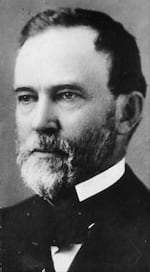It was brief, but for a moment, Oregon was the undisputed Thanksgiving capital of the nation. The state officially held Thanksgiving twice in 1893 and twice again in 1894.
The announcement of separate Thanksgivings was made by Oregon's brash, divisive Gov. Sylvester Pennoyer. He likely announced the holiday out of spite for President Grover Cleveland.
His proclamation of a separate Thanksgiving shocked the nation, but given his history, it shouldn't have been unexpected.
Oregon's Eighth Governor, Sylvester Pennoyer
Pennoyer had an astronomical political rise. In just two years, he went from losing the race for Portland mayor — in part due to his past as a Confederate sympathizer — to the highest office in the state.
Pennoyer campaigned with an anti-Chinese, pro-labor message. His views aligned with many in the West who accused Chinese immigrants of stealing jobs. Positioning himself as the leader of the anti-Chinese movement, he rode the xenophobia gripping the western U.S. to the governorship.

Sylvester Pennoyer, Oregon's eighth governor.
During his first year in office, as many as 35 Chinese miners were gunned down at a camp in Oregon. The killers were known, but no one was ever convicted. OPB produced a documentary on the event, which some have called the most significant Chinese massacre in American history.
The Oregonian newspaper wasn't a fan of the new governor. They called him a demagogue, who was famous for “the general unsoundness of his opinion.”
Pennoyer's profile grew to a national level with the extension of the Chinese Exclusion Act.
The federal law barred Chinese laborers from entering the country. The extension added a provision that laborers already in the country needed to carry a residential permit at all times.
President Cleveland warned governors that the extension could incite violence and ordered them to protect Chinese-Americans in their state.
Pennoyer curtly replied: "I will attend to my business; Let the President attend to his."
In fact, he disliked Cleveland so much he locked up the state's ceremonial cannons so they couldn't be fired in celebration of the president's inauguration. Pennoyer would dramatically snub Cleveland a few months later on Thanksgiving.
Oregon's Two Thanksgivings
Although celebrated in New England since the 17th century, it took the Civil War to make Thanksgiving a national holiday.
President Lincoln issued a proclamation calling on all Americans to give thanks for the blessings of the year and, in the midst of the brutal war at home, asked the country to "pray to heal the wounds of the nation."
He called for observance of Thanksgiving on the last Thursday of November.
Nearly every year from that point on, the president would announce the last Thursday in November as Thanksgiving.
Fast-forward 30 years, Pennoyer decided to give his proclamation two days before President Cleveland. His opening sentence read: "I do hereby appoint the fourth Thursday ... as Thanksgiving."
November 1893 had five Thursdays.
When Cleveland followed Lincoln’s tradition, Oregon was left with two Thanksgivings. Oregon's headstrong governor refused to change the date.
It could have been a mistake, but the exasperated Oregonian newspaper thought otherwise:
“The accident that November has five Thursdays this year gave Pennoyer the opportunity to again claim his independence.”
An editorial in the Chicago Journal had some harsher words for Pennoyer, saying he was a "gubernatorial freak with execrable taste and bad manners and his proclamation an outrage ... Illinois extends her most profound sympathy to Oregon."
All offices and courthouses at the Capitol were closed for both Thanksgivings, but Oregonians, for the most part, ignored Pennoyer's Thanksgiving.
Nonetheless, the next year — his last as governor — Pennoyer again used the opportunity of November having five Thursdays to announce a separate Thanksgiving.
Pennoyer’s Thanksgiving was largely forgotten over time. Today, his holiday-proclaiming legacy is felt in September — on Labor Day. He made Oregon the first state to officially recognize the holiday in 1887.
But in 1941, Congress passed a joint resolution to once and for all mark the official day for Thanksgiving; it would be the fourth Thursday of every November.
In other words, for better or worse, we now all celebrate Pennoyer’s Thanksgiving.
